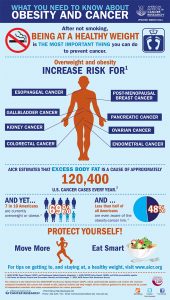Among the population as a whole, research shows a strong link between being obese and increased risk of pancreatic cancer. Now a large new analysis suggests that obesity increases the risk of African Americans dying from pancreatic cancer, a cancer that affects African Americans more than any other racial group.
The study was published in Cancer Epidemiology Biomarkers and Prevention.
African Americans are diagnosed with and die from pancreatic cancer more than any other racial group, according to the National Cancer Institute. Previous research focusing on obesity, African Americans and pancreatic cancer included only a few study that gave conflicting findings.
For this analysis researchers pooled data from seven studies, including almost 240,000 African Americans. The studies all had used self-reported information to calculate BMI, a standard measure of body fat.
After an average of almost 12 years, 897 of the men and women had died from pancreatic cancer. Among those followed for at least five years, obesity was associated increased risk of dying from pancreatic cancer compared to those at a healthy weight. Obesity here included those with a BMI 30 and over. Risk trended towards increasing as weight increased.
Results were similar among men and women.
Other key risk factors for pancreatic cancer include diabetes and smoking, both of which the analysis took into account.
Higher BMI linking to pancreatic cancer mortality was strongest among those who never smoked. Because smokers are at especially high risk, the obesity association may be more difficult to detect among smokers, the authors hypothesize.
There are several ways in which obesity may link to pancreatic cancer, including its role in chronic inflammation. AICR research links obesity to increased risk of seven cancers. For pancreatic cancer, AICR estimates that being lean could prevent 19 percent of cases in the United States every year.
For more on obesity and reducing risk of pancreatic cancer visit our What You Need to Know section. The National Cancer Institute has other risk factors and symptoms.
This study was supported by the National Cancer Institute. Funding to individual cohorts and investigators included grants from the National Cancer Institute and the American Cancer Society.






